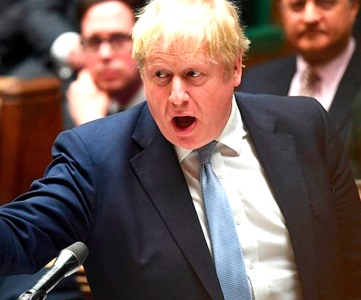
Life of litany of lies
On July 7, 2022, Mr Boris Johnson, the British prime minister, reluctantly announced his resignation. “Boris Johnson will resign as Conservative leader today, continuing as UK prime minister until autumn …” The BBC informed the world.
Mr Johnson’s departure has been the wish of some who openly expressed their relief on hearing the news of his decision to decamp from Downing Street. Mr Johnson survived a vote of no confidence not too long ago in the British parliament.
A known liar, Mr Johnson’s fate is testament that when it comes to ethics, the law of gravity often applies to all, eventually.
The litany of lies that is the signature of Mr Johnson’s life caused his disgraceful departure from office at this critical time when Britain and the world needs focus from Number 10 Downing Street.
Litany of lies
Mr Johnson lies in trivial matters. In 2002, The New York Times wanted Mr Johnson’s photograph for a story. Mr Johnson arranged with an employee of the Spectator magazine, where he worked at the time, to impersonate him. The attempted mischief was to mislead the Times to publish the wrong photo and be embarrassed.
Mr Johnson also lies in non-trivial matters. When Mr Johnson decided to run for office as an MP, he promised the editor of the Spectator that he would stop editing for the magazine once elected.
He also told his constituents that he would give up his job at the Spectator to focus on his parliamentary work. He reneged on both promises.
Some had high hopes that the grace of the high office of prime minister would purge Mr Johnson of his life of lying.
Partygate broke their hopes and, probably, their hearts as well. Partygate refers to the drinking parties that Mr Johnson secretly attended, sometimes late into the night, while the rest of Britain was mourning and under one of the strictest lockdowns.
Mr Johnson lied there were no parties when there were 16 parties. Mr Johnson lied that he was not involved in these parties when photographic evidence showed him in active attendance.
Mr Johnson lied that partygoers complied with COVID-19 restrictions when the police fined them for non-compliance. And finally,
Mr Johnson lied that his team ill-advised him to attend these parties.
The final lie that broke Mr Johnson’s back was another party involving his appointee, Mr Chris Pincher. In his position, Mr Pincher was charged with overseeing the Conservative party’s discipline and welfare.
Mr Pincher is accused of groping two men at a party while drunk. Mr Johnson lied he knew about Mr Pincher’s past sexual impropriety before appointing him.
British exceptionalism
Great Britain has historically viewed itself as an exceptional caste set apart from others. Great Britain, albeit not the only one, colonised vast areas of the world in the past, including Ghana with multiple aims, among them to civilise these colonies.
Magisterial scholars from Great Britain write so proudly, almost arrogantly, about the virtues of the United Kingdom and its people, palpably wishing that the social and political virtues aplenty in Britain were present in other places, as to dispel the darkness of these distant lands and erode the ignorance of their barbarous cultures.
Albert Venn Dicey, a British political theorist, is often credited with coining and articulating the term: rule of law (though the term predates him to Aristotle, arguably to even Plato). Dicey is one such British subject who thinks so highly of Great Britain among the comity of nations.
In his magnus opus, The Introduction to the Law of the Constitution, Dicey thinks of the rule of law as peculiarly unique to Great Britain and notably absent in other places.
Though Dicey fails to define the rule of law, he pinions the term down to three essential elements. These three features may be distilled into the view that the law, not man, is supreme, and even the elite and the powerful such as Mr Johnson is subject to the law.
But Boris Johnson has made Britain’s claim to exceptionalism, especially its status as the bellwether of the rule of law, a joke through his life of litany of lies, both petty and big.
Tragically, Mr Johnson’s tenancy at Number 10 Downing Street is fading when the world so badly needs the steady hand of Britain to help steer the global ship skillfully through the Russian Ukraine war, rising food prices, recovery from the pandemic, and, of course, a planet that is increasingly turning into a steaming oven.
Britain has denied the world another Winston Churchill when it was opportune and critical to have a Churchill “attend to the stuff that matters.”
But more tragically – and to the credit of the British people – leaders like Mr Johnson who abound elsewhere remain at post, waiting out their term in office. The British people are exceptional after all as Dicey claims. Probably.
The writer is a lawyer/doctoral fellow at Fordham Law School, N.Y., USA. E-mail:
